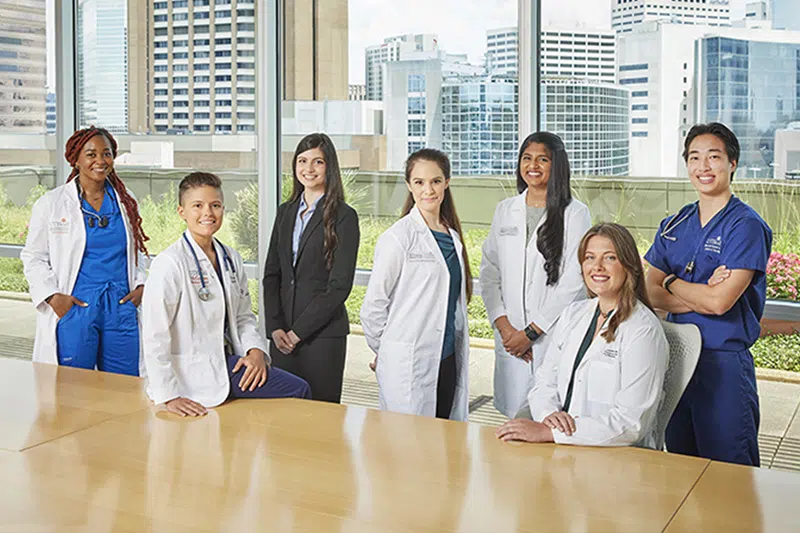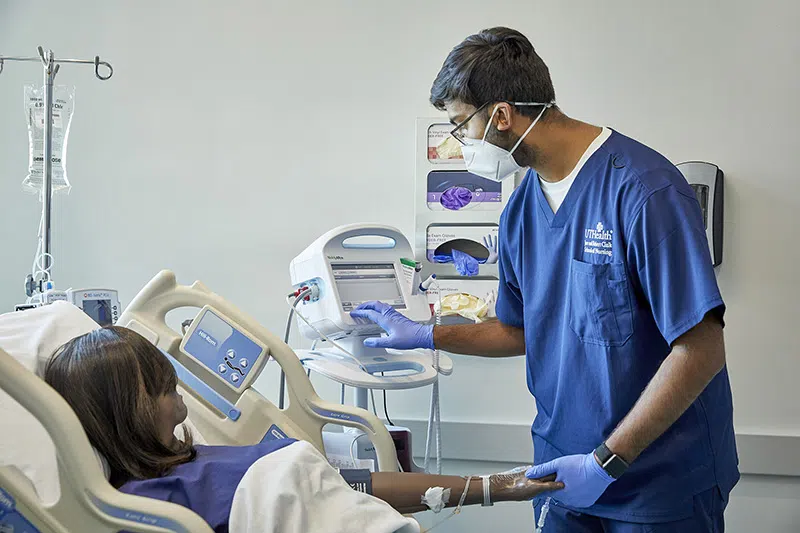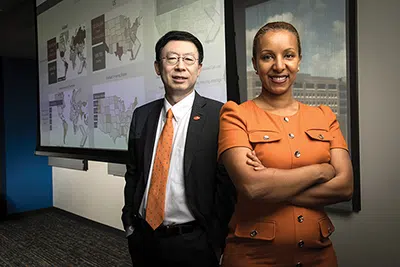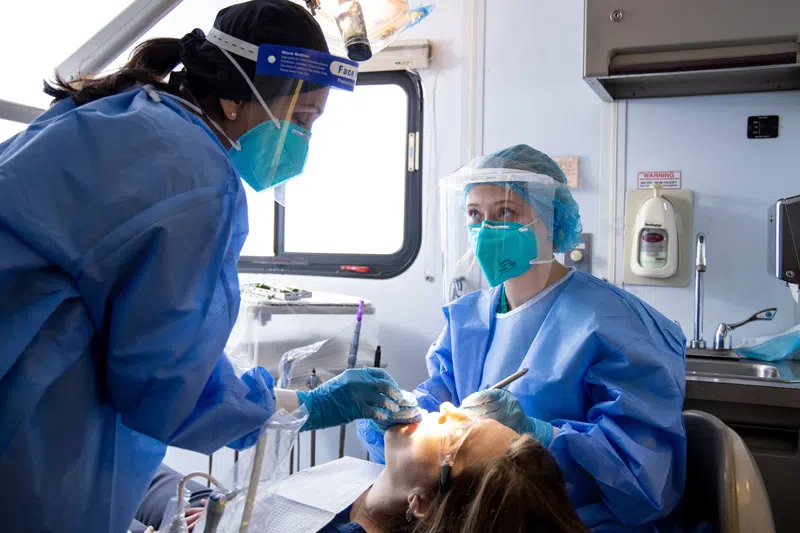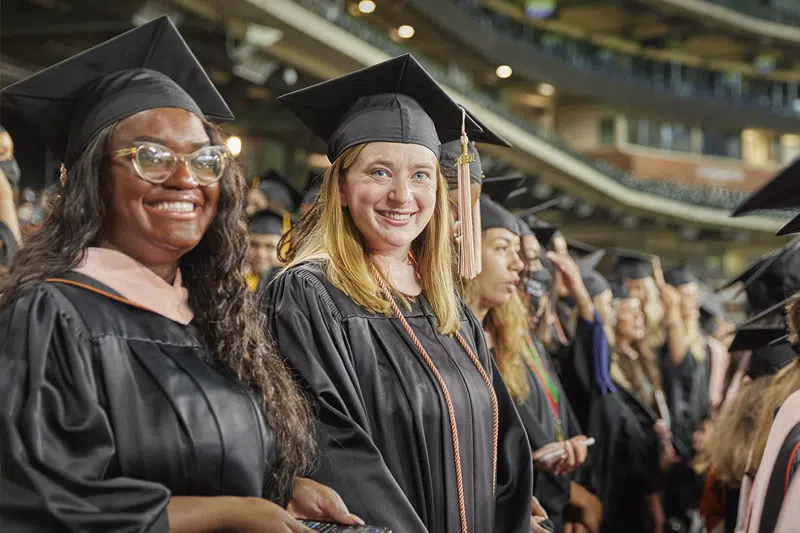UTHealth encourages the development of collaborative relationships among faculty around research and academic mission-related interests. To that end, UTHealth enables academic departments, schools, and the university itself to establish fee-for-service research service centers (“RSC”), and other research facilities and services for specific purposes in pursuit of these missions. To learn more about the policies governing the development and administration of RSCs, see Development and Administration of Research Service Centers.
Shared Research Resources
Atomic Force Microscopy Facility
Atomic force microscopy (AFM) has emerged as a key platform for studying the morphological and nanomechanical properties of living biological systems. It is making a vital contribution towards understanding various pathological disorders and the development of innovative therapeutic approaches.
Services of our core include:
- AFM imaging combined with bright-field/fluorescence microscopy
- Topographical imaging of samples in air or liquid environments
- High-resolution imaging at the nanometric scale
- Time-lapse experiments that show real-time changes in sample structure
- Nano-probing of samples to measure the interaction of forces between molecules
- Studies of local micromechanical properties of samples (elasticity, stiffness, adhesion, roughness)
- Data analysis for determination of homogeneity of samples, size distribution, position, mapping and 3D imaging
Please contact the core director for consultations. Service requests are available through our iLab portal.
Core Director: Ana Maria Zaske, PhD
Email: ana.m.zaske@uth.tmc.edu
Phone: 713-486-5418
Bioinformatics & High Performance Computing Service Center
The UTHealth Bioinformatics Service Center provides expertise to process and analyze biological data. Center faculty focus on gene expression, genotyping, proteomics, metabonomics, and next-generation sequencing data and can also perform custom or other complex analyses. Additional services available include experiment design and assistance in developing grant applications and manuscripts.
Please view our main webpage here.
Core Director: W. Jim Zheng, PhD
Email: wenjin.j.zheng@uth.tmc.edu
Phone: 713-500-3641
Biomedical Informatics
A diverse group of Informaticians and IT professionals with backgrounds in Computer Science, Applied Mathematics, Project Management, Library Sciences, Biology. We collect, interpret, and manage data for the support of clinical and translational research. As co-investigators we develop new methods for reusing data for research.
All of our services are available for reservation through our iLab portal.
Please view our main webpage here.
UTHealth Cancer Genomics Center
The UTHealth Cancer Genomics Center (CGC) provides next-generation sequencing (NGS) and advanced bioinformatics services to the cancer and related investigators in UTHealth, Texas Medical Center, and other Texas regions. Services include, but are not limited to, biospecimen collection and management, DNA, RNA and other sample preparation, library construction, sequencing, bioinformatics services and support, consultation of study design and grant proposal development. The core can perform the analysis of omics data generated elsewhere too.
Please view our main webpage here.
All of our services are available for reservation through our iLab portal.
Core Director: Zhongming Zhao, PhD, MS
Email: zhongming.zhao@uth.tmc.edu
Phone: 713-500-3631
Cellular Therapy Core
The Cellular Therapy Core (CTC) consists of the Judith R. Hoffberger Cellular Therapeutics Laboratory and the Evelyn H. Griffin Stem Cell Therapeutics Research Laboratory. The Hoffberger laboratory is located on the 6th floor of the Medical School Building and is focused on translating, scaling-up, validating and supporting IND applications (CMC section) of promising new therapeutic technologies developed by scientists and physicians at a preclinical level into clinical-grade processes that can be used to manufacture cell-based and/or tissue engineered products for clinical applications. The Griffin Laboratory is located on the 6th floor of the Behavioral and Biomedical Sciences Building (BBSB) and is an FDA-registered facility accredited by the Foundation for the Accreditation of Cellular Therapy (FACT) for Cellular Therapy Product Processing with more than minimal manipulation (see accreditation certificate). In the Griffin lab, tissues and organs are processed to produce cells for clinical applications in compliance with current Good Manufacturing Practice (cGMP).
Among services provided by the CTC are:
- Early involvement of experts in regulatory issues and process development
- Development and/or translation, optimization, scale-up and validation of manufacturing processes
- Development and writing of Standard Operating Procedures (SOPs)
- Development and validation of protocol-specific quality control (QC) assays
- Support of IND applications (CMC section)
- cGMP-compliant manufacturing of clinical-grade cell and/or tissue engineering products
Please view our main webpage here.
All of our services are available for reservation through our iLab portal.
Core Director: Fabio Triolo, PhD
Email: fabio.triolo@uth.tmc.edu
Phone: 713-486-2542
Center for Advanced Microscopy
The Center for Advanced Microscopy is a state of the art microscopy facility which directly supports the Department of Integrative Biology and Pharmacology. The facility is available for use by scientists within UTHealth and the Texas Medical Center. Available equipment includes:
- Nikon A1R Confocal Laser Microscope System
- Nikon A1 Confocal Laser Microscope System + PicoQuant
- Nikon A1Rsi HD Confocal and n-STORM Super-Resolution Microscope System
- Nikon n-SIM Structured Illumination Super Resolution Microscope System
- Calcium Rig: Nikon TiE Wide-Field Fluorescence Imaging System (filter-based)
- Data Processing Computer
- IVIS Lumina XR
- Lambert LIFA Fluorescence Lifetime Imaging Microscopy system
Please view our main webpage here.
All of our services are available for reservation through our iLab portal.
Facility Manager: Ryan Durham, PhD
Email: advancedmicroscopy@uth.tmc.edu
Center for Craniofacial Research Instrumentation (CCRIC)
UTHealth Center for Craniofacial Research Instrumentation Core (CCRIC) is a shared research resource that provides training, instrumentation, and data analysis support. The purpose of the CCRIC is to enhance and expand collaboration at UTSD, other UT Schools and outside institutions. The instruments available are located in both the BBS (Behavioral and Biomedical Sciences) and SOD (School of Dentistry) buildings.
Bioprinters:
- Aspect RX1 Bioprinter
- Allevi Bioprinter
Microscopes:
- Nikon C2 confocal Microscope
- Nikon NiE upright Fluorescent Microscope
- Keyence Bz-X800E Microscope
- Nikon A1R/MP Confocal/Multiphoton microscope
- EVO 10 SEM (Scanning Electron Microscope)
- Instruments for sample preparation for the SEM: Quorum 3100 Critical Point Dryer and Quorum Q150RS Plus Sputter Coater
- Nikon SMZ800 Zoom Stereo Microscope
- Nikon SMZ18 Zoom Stereo Microscope
Other Specialized Equipment available at the core:
- BioTek Cytation5 Imaging Multi-mode Reader
- Waters HPLC
- Flexcell FX-5000 Compression System
- TA Instruments DHR-3 Rheometer
- ULS VLS 3.5 Laser Cutter
- IntelliPATH FLX (Autostainer Biocare)
Workstations:
- Mission Control Workstation: Imaris , NIS Elements
- SolidWorks Premium with Flow Simulation Workstation
All of our services are available for reservation through our iLab portal.
Facility Manager: Lissette A. Cruz
Email: ccric@uth.tmc.edu
Phone: 713-486-4476
Center for Laboratory Animal Medicine & Care (CLAMC)
CLAMC is responsible for the health and well being of laboratory animals used for the institution's biomedical research programs. CLAMC works in tandem with the institutional Animal Welfare Committee, and it meets all standards mandated by the Animal Welfare Act, Center for Disease Control, National Research Council Guide for the Care and Use of Laboratory Animals, Association for Assessment and Accreditation of Laboratory Animal Care - International, and the Public Health Service Policy on Humane Care and Use of Laboratory Animals.
Please view our main webpage here.
Clinical Research Unit (CRU)
The mission of the CCTS CRUs is to facilitate clinical research by providing investigators with specialized facilities, personnel, and advice. Investigators from CCTS institutions (UTHealth, M. D. Anderson Cancer Center, and Memorial Hermann Hospital System) can use any of the CCTS CRUs, depending on the location of their patients and the availability of services at the CRUs.
Please view our main webpage here.
Core Contact: Kathy Franco, RN
Email: kathy.d.franco@uth.tmc.edu
Phone: 713-407-4147
DNA Sequencing and Genotyping Core Lab
The DNA Sequencing and Genotyping Core Lab, CCTS, provides consultative expertise, mentoring, and technical support for studies, while employing genetic technologies, including DNA sequencing, genotyping techniques, data collection, and statistical analyses. The DNA Sequencing and Genotyping Core Laboratory Program is composed of four major components:
- Consultative and mentor-based support services that provide individual investigators with guidance in the design, application, and interpretation of their genetic studies
- Expertise in issues relating to proper informed consent for genetic studies and genetic counseling for patients enrolled in the studies.
- Sanger DNA sequencing and microsatellite and SNP genotyping services that generate preliminary data supporting translational genetic research studies.
- Infrastructure for banking DNA and other samples from patient populations and management system for sample tracking.
Please view our main webpage here.
Core Director: Dongchuan Guo, PhD
Email: dongchuan.guo@uth.tmc.edu
Phone: 713-500-6849
Electron Cryo-Microscopy Facility
The mission of Electron Cryo-Microscopy (Cryo-EM) Core Facility at UTHealth is to provide researchers access to the state-of-the-art cryo-EM resources and expertise.
Instrumentation and Services:
- Titan Krios G3 (300 KeV X-FEG) electron cryo-microscope equipped with
- Polara F30 (300 keV FEG) electron cryo-microscope equipped with
- Ancillary equipment required to prepare optimal cryospecimen
The Cryo-EM Core Facility is able to provide high-resolution imaging for single particle analysis and for electron cryo-tomography (cryo-ET). We offer diverse service packages for expert to novice users including: optimization of cryo-specimen preparation, high-resolution cryo-EM data acquisition
Please visit our main webpage here.
All of our services are available for reservation through our iLab portal.
Core Director: Irina I. Serysheva, PhD
Email: irina.i.serysheva@uth.tmc.edu
Flow Cytometry Service Center
UTHealth Flow Cytometry Service Center provides training, instrumentation and data analysis software to support your single cell analysis and sorting needs. We have instruments available in both the medical school (5-laser LSR Fortessa analyzer) and IMM (6-laser FACS Aria II cell sorter and 2-laser FACSCalibur analyzer) buildings.
Our services include:
- Assisted and unassisted data acquisition
- Assisted and unassisted cell sorting
- Sorting for single cell deposition (e.g. 96 well plate)
- Post-acquisition data analysis (FlowJo, Diva, Kaluza)
- Experimental design assistance including panel design, controls, etc.
- Technical troubleshooting
- Training to become an unassisted user
Please view our main webpage here.
All of our services are available for reservation through our iLab portal.
Core Director: Ville Meretoja, PhD
Email: ville.meretoja@uth.tmc.edu
Phone: 713-500-2486
Magnetic Resonance Imaging (MRI) Facility
The main emphasis of the MR research group at the McGovern Medical School at UTHealth is the development and application of advanced magnetic resonance imaging (MRI) techniques, including selective tissue imaging, magnetic resonance spectroscopic imaging, diffusion tensor imaging to neurological disorders, central nervous system trauma, and drug addiction both in humans and animal models.
Another major emphasis of our research is the development of novel image processing techniques that are robust and automatic for handling large number of images that are typically encountered in multi-center clinical trials.
The laboratory facilities include a 7 Tesla, state-of-the-art MRI scanner dedicated to animal studies with a fully equipped animal surgical suite, a research dedicated 3 Tesla whole body scanner, and an image processing laboratory with a high performance computing cluster and GPU processing.
Please view our main webpage here.
All of our services are available for reservation through our iLab portal.
Core Director: Nelly Arias
Email: nelly.arias@uth.tmc.edu
Phone: 713-500-4583
McGovern Medical School Histology Lab
Our fully functional histology laboratory is equipped with state-of-the-art equipment to perform all aspects of histology processing, sectioning, and staining. Our laboratory is CLIA/CAP certified, staffed by experienced and professional histologists and histotechnologists, and provides high quality services for UT researchers. We will consider providing services outside of UT in the future.
Histology Services available for human and animal tissues:
- Cutting and staining sections from frozen tissues (frozen sections)
- Processing and paraffin-embedding of cells (cell lines) and tissues
- Cutting sections from formalin-fixed and paraffin-embedded cells and tissues
- Special stains: Please see list of currently available tests; we can evaluate and perform special stains that are not on the list upon request
- Immunohistochemical stains, single color and double-color. More colors can be considered
- Immunofluorescence
- In situ hybridization
Pathology Services:
We are available for consultations and collaborations:
- We can recommend the most appropriate reagents to purchase and tests to utilize.
- We can help with evaluating tissues for disease processes and for biomarker expression and analysis.
All of our services are available for reservation through our iLab portal.
Core Director: Gustavo Ayala, MD
Email: gustavo.e.ayala@uth.tmc.edu
Phone: 713-500-5356
Lab Supervisor: Melissa Stephens, MS, HT/HTL (ASCP)
Email: melissa.stephens@uth.tmc.edu
Phone: 713-500-5364
MicroCT Imaging Center
The MicroCT Imaging Center provides high-resolution 2D and 3D in vivo and ex vivo CT imaging with a Bruker SkyScan 1276 system. Samples up to the size of an adult rat can be imaged at resolution down to a voxel size of 3 microns. The instrument is operated on a charge-per-use basis and can be used independently (following user training) or with technician assistance.
All of our services are available for reservation through our iLab portal.
Imaging Technician: James Ahn
Email: john.j.ahn@uth.tmc.edu
Core Director: Sean P. Marrelli, PhD
Email: sean.p.marrelli@uth.tmc.edu
Phone: 713-500-7898
Proteomics Service Center
The Proteomics Service Center provides state-of-the-art instrumentation and services to the entire UTHealth and surrounding research community. Our center offers both routine services for faculty who cannot afford nor desire the purchase of their own mass spectrometry instrumentation and collaborative research requiring advanced methods. The center works in a collaborative fashion between faculty, students and staff to customize services to suit individual projects.
The state –of –art instrumentation:
- Thermo LTQ Orbitrap XL-ETD mass spectrometer
- Agilent's 6538 Ultra High Definition Accurate-mass Q-TOF
- Agilent's 6430 Triple Quadrupole LC/ MS
- Applied Biosystems/MDS SCIEX QSTAR Elite Mass Spectrometer
A full range of the services:
- Protein identification from 1D gel bands, 2-D spots and other matrices
- Molecular weight determination, peptide and protein QC
- Targeted Proteomics (SRM) for biomarker discovery as well as quantitation of selected proteins or peptides in a complex mixture
- Biomarker discovery and verification
- Pharmaceutical protein QA & QC
- Characterization of immunoprecipitated or affinity-purified proteins and protein complexes
- Global protein profiling with quantitative comparisons between samples (Label free, iTRAQ, SILAC etc)
- Enrichment and characterization of post-translationally modified proteins and peptides
Please view our main webpage here.
All of our services are available for reservation through our iLab portal.
Core Contact: Li Li
Email: li.li@uth.tmc.edu
Phone: 713-500-2456
Small Animal Cardiovascular Phenotyping Service Center at McGovern Medical School
The Small Animal Cardiovascular Phenotyping Service Center at McGovern Medical School provides access to equipment and expertise for imaging and analysis of small animal cardiovascular physiology, including:
- State-of-the-art Vevo 3100 echocardiography platform with VevoVasc Ultra software
- Doppler system for high-velocity vascular flow measurements
- Coda tail-cuff volume blood pressure recorder
- ADInstruments PowerLab and LabChart Pro high-fidelity pressure recording system for use with Millar pressure catheters
- Leica A60 S Stereo Microscope with image capturing system
Please visit our main webpage here.
All of our services are available for reservation through our iLab portal.
Core Director: Yvonne Arceneaux
Email: yvonne.arceneaux@uth.tmc.edu
Transgenic and Stem Cells Services
The Transgenic and Stem Cells Core Facility was established in 1998 and since that time, it has generated over 650 new transgenic and knock-out mouse animal models for investigators from UTHealth, as well as for scientists from numerous other academic institutions.
The stem cell lines that have been derived in the laboratory are highly effective for the generation of knock-out/ knock-in mice and for cell differentiation studies. In addition to the production, cryopreservation and re-derivation of genetically-engineered mice and rats, the services of the facility also include gene targeting, derivation of new cell lines and intellectual/technical support in different aspects of microsurgery, cell culture and stem cells research.
Please visit our main webpage here.
Core Director: Aleksey Domozhirov
Email: aleksey.y.domozhirov@uth.tmc.edu
Phone: 713-500-2452


 Featured Donor
Featured Donor
